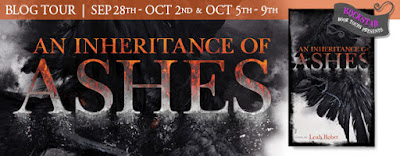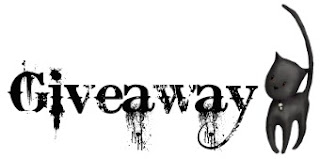
Hey everyone! Welcome to my stop on the blog tour for An Inheritance of Ashes! Today I have a fantastic guest post by the author to share with you - and don't forget to enter the giveaway! To follow the rest of the tour, check out the schedule at the bottom of the post.
An Inheritance of Ashes
Genre: YA Dystopia/Fantasy
Release Date: October 6, 2015
Publisher: Clarion Books
Formats: Hardcover, ebook
400 pages
Description:
When Hallie hires a veteran to help them, the war comes home in ways no one could have imagined, and soon Hallie is taking dangerous risks—and keeping desperate secrets. But even as she slowly learns more about the war and the men who fought it, ugly truths about Hallie’s own family are emerging. And while monsters and armies are converging on the small farm, the greatest threat to her home may be Hallie herself.
Top Ten Favorite Books
10) David Mitchell's Cloud Atlas
Cloud Atlas is genius. It's an absolute masterpiece of structure: Six sections of story, each cutting off exactly 40 pages in, running forward in time from the log of a colonial sailing ship journey to present-day detective thrillers to a robot dystopia and then a wild, distant future—and all the way back down. And that's before you realize that the guy on the sailing ship's diary is in the drawer where the composer's assistant works, and the composer's records are in the store where the 1970s detective stops to pick something up…
The whole story is nested. It bends reality, and the amazing thing is, it works. Cloud Atlas manages to tell a coherent, powerful story about choice and connectedness and how the ways we move ourselves in the world matter. It somehow works.
It's the book that made me a lifelong Mitchell reader; I've got the ARC of his latest on my desk as we speak, and it'll be my treat for clearing my to do list this week.
9) Catherine Bush's Minus Time
Minus Time is very dear to me. It's perhaps the first novel that showed me you could write about science fictional or fantastical things in a literary way, full of the quiet and uncanny and emotional, and have that be a coherent book. That there is really no difference between genre fiction and literary fiction if you don't actually want there to be, and if you just want to tell a story about mysterious doppelgangers of yourself appearing while your mother is on a long-term space mission and you're hiding your identity, doing semi-illegal activist work, to dodge the press, well. Carry on.
What's more, Minus Time is one of my very first Toronto stories. When I was fifteen and restless and feeling stuck in the suburbs, waiting on the weekends to get into the city to see a friend's Battle of the Bands show or look for concert posters on Queen West, it was one of my earliest and biggest windows into the city that I love: a book that told me that my city would love me right back, and there'd be a place for me to stretch my wings wide once I got there.
8) Sean Stewart's Galveston
I weighed whether I wanted to pick this one or his earlier Resurrection Man, which is a much shorter, much stranger, and just as emotionally powerful novel—and it might not matter. Stewart writes beautiful, spare, simmering books that are all absolutely broken in one crucial way each. It's a different way every time. The thing is, they're so breathtaking I don't really care about the broken parts.
Galveston, like most of the rest of his work, is set in a world where magic is real and rose like a tide one day decades ago, and it's remade the face of the world in ways both blatant and subtle. It's a book full of ghosts and people finding their own strength, and crucially for a Stewart novel, it's a book about realizing you are an absolute screwup asshole—and looking down the barrel of what you're going to do about it.
He's no longer writing fiction—he moved on to games and ARG writing, and is apparently quite happy there—but I would possibly bargain a year of my life for a new Sean Stewart novel. Nobody writes failure the way he does, and nobody writes redemption and resurrection and messy love.
7) Maggie Stiefvater's The Scorpio Races
A friend introduced me to Maggie Stiefvater's work two years ago, and this book slipped into the little locked box of perfect novels that we all carry around inside us. A quiet little book about the first girl to compete in the races on an island where the man-eating horses come yearly out of the sea—and the boy who's working hard as a jockey to buy the freedom of the monster-horse he loves—it is something wild and unique and amazingly restrained. The Scorpio Races is all quiet prose and insane amounts of emotion boiling just below the surface. It is so soft, and yet it crackles.
I read it in one day, and then I hugged it and cried with relief at the end. And I'm pretty sure that one day, when I'm having a bad day, I will do that all again.
6) China Mieville's Embassytown
Embassytown is not much like the other books on this list: It's a sprawling, inelegant, high-concept science fiction novel that throws you right in the deep end and forces you to figure your own way out. Its protagonist, Avice, who grows up on a planet run by an alien species who cannot lie, is a living simile: Someone who enacts a figurative expression so her neighbours can use that expression.
It's both the concept of linguistic science fiction that makes this memorable for me—my undergraduate degree's in linguistics, and so this book was basically candy—but it's also what simile Avice represents: “the girl who was hurt in the dark and ate what was given to her". It's graphic in its implications, absolutely awful without ever saying precisely what she had to do. But that fictional simile made me think, a lot, about what it means to eat what's given you; to eat metaphorical garbage and not just stand up, flip the table, and demand better.
I don't think that's accidental. It's a book about standing up and demanding better. It made me braver. It still does.
5) Meredith Ann Pierce, The Darkangel
I came across The Darkangel when I was a little too young to really grasp what I had on my hands. It's a young adult science fiction novel with the structure and tone of a darkest fairy tale, full of vampires, starhorses, thirteen ghostly brides, and a green, terraformed moon.
The Darkangel reads like a good-bad dream: poetic, weird, and filled with this gorgeous sense of dread. It defies basically every expectation you could have of a book, and yet the core of it is emotionally deeply true. It knows a few things about people, about responsibility, and about love.
4) Oscar Wilde's The Happy Prince and Other Stories
I've had Wilde's The Happy Prince and Other Stories since I was about five, and it's one of the very few books that's absolutely held up over all the years since. It's a collection of short stories, mostly fairytales and fables, and they're in some ways ridiculously dark. Most of the pieces in the collection—the title story especially—basically let you know that the reward for doing something moral is usually getting crapped on. But they're also amazingly strong and hopeful. Because it also lets you know that do it anyway. Because.
In some ways, Wilde taught me everything I needed to know about writing YA: When you're speaking to younger readers, you don't talk down; you look your readers in the eye. Unlike a lot of the kids' books I had, Wilde's stories decidedly looked me in the eye and treated me, the reader, like a smart person who could have serious conversations. That mattered to me when I was young. It's mattered to the way I write now, too.
3) Carla Speed McNeil's Finder
This is cheating, because Finder is an ongoing graphic novel series, rather than a specific book. But it is one of the most unique, memorable, and loved things on my bookshelf.
McNeil describes Finder as "aboriginal science fiction", and it's a perfect fit: A sprawling collection of stories in a far-future, ultra-modern society that centre around two aboriginal characters and the people they care about—and how everyone in that extended family navigates their world. Everyone in it is drawn with this unflinching sense of compassion; everyone is the protagonist of a story going on somewhere off the page. While it's gathered in two big omnibus volumes now, I bought it in trades, and if you're looking to dip in, look out for the Talisman arc: It's the truest love letter to a book I've ever read in my life.
2) Katharine Addison's The Goblin Emperor
The Goblin Emperor was my standout book of 2014, and the best fantasy novel I've read in a long, long time. It has all the intricacy, worldbuilding depth, and political nuance of George R.R. Martin's Song of Ice and Fire novels, but instead of its core values being stabbing each other in the kidneys and betrayal, it's a book about how to be compassionate; how to assert yourself and still be generous; how to be a good king.
Maia, the title half-goblin prince who unexpectedly inherits the throne of the Empire of the Elflands after his father and half-brothers die in an explosion, is one of the kindest, most wonderfully conflicted characters I've ever read. I wanted him to be okay, almost instantly, and the ways he works toward that—the choices he makes for himself and for the empire he's responsible for—are smart and unexpected and made me feel like there was, yes, good in the world again.
This was the book I needed in a week when I really needed it, and I keep it to reread in case I need it again.
1) Peter S. Beagle's The Last Unicorn
The Last Unicorn is basically it. It's the book of my heart. It is the story.
I read it once every year or two, when I have a little quiet time to be alone, and every time I find something new in it; some idea or perspective or meaning I didn't see before. My favourite characters change as I grow up and it somehow, still, grows with me. It is always magic, and it always makes me cry, and I always walk away from it feeling clean and whole and good. I will still read The Last Unicorn when I am eighty, and I'm sure it'll change under my hands then, too. I'm sure that book and I will still talk.
Leah Bobet is a bookseller, publisher, and editor as well as a Pushcart-Prize nominated author. She lives in Toronto. www.leahbobet.com
(3) Winners will receive a finished copy of AN INHERITANCE OF ASHES - Open to US Only!






I just love your cover and it sounds amazing! I LOVE LOVE LOVE The Last Unicorn.
ReplyDeleteThis book looks and sounds absolutely F-A-N-T-A-S-T-I-C. Thank you for the great giveaway!
ReplyDeleteNot only has an awesome cover but it sounds good too.
ReplyDeleteThe book sounds fantastic and the cover is gorgeous! A definite add to the TBR Pile
ReplyDeleteThe cover looks awesome and the book sounds really interesting! I'm excited to read it! Thanks for the giveaway!
ReplyDelete